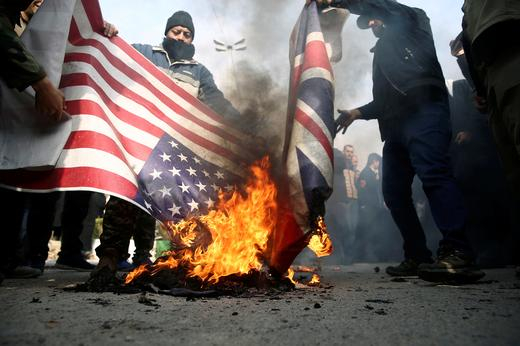The U.S. killing of Qasem Soleimani happened so fast and the consequences are so uncertain that many have been comparing it with the Sarajevo incident that triggered World War I.
Soon after the news of the top Iranian general's death broke, the hashtag #WWIII began trending on Twitter and Facebook, conveying a mix of concerns about potential escalation and also the lack of both clear "red lines" and communication channels.
"I don't think the U.S. government has thought through a roadmap of what happens next." Randa Slim, senior fellow at the Middle East Institute, told CGTN.
What happened in Iraq over the past two weeks certainly crossed Trump's "red line."
The major trigger for the two bombings was the killing of an American and wounding of four soldiers at the K1 base in Kirkuk, Iraq. This came after 10 attacks against U.S. installations which Washington did not respond to militarily, instead opting to pressure the Iraqi government to reign in the Popular Mobilization Forces (PMF).
However, the protests and the attacks on the U.S. embassy in Iraq were too much for Trump. This was a Benghazi-like moment that he felt he had to respond to in an election year.
On September 11, 2012, armed militants killed Ambassador J. Christopher Stevens, the State Department's Sean Smith, and diplomatic security agents Tyrone Woods and Glen Doherty in Benghazi, Libya. As the presidential campaign that year wore on, this incident cast a shadow over the then Secretary of State Hillary Clinton and the former President Barack Obama, and for some, that shadow has never really been cleared.

U.S. Secretary of State Hillary Clinton testifies on the September attack on U.S. diplomatic sites in Benghazi, Libya during a hearing held by the House Foreign Affairs Committee on Capitol Hill in Washington, January 23, 2013. /Reuters Photo
U.S. Secretary of State Hillary Clinton testifies on the September attack on U.S. diplomatic sites in Benghazi, Libya during a hearing held by the House Foreign Affairs Committee on Capitol Hill in Washington, January 23, 2013. /Reuters Photo
But Trump's order to kill Soleimani might not lead to the positive reaction he expected. Polling last September indicates three-quarters of Americans, including a majority of Republicans, believe "war with Iran would be unwarranted," and "the public mostly blames the Trump administration for heightened tensions with Iran and disapproves of Trump's Iran policy."
On top of that, the validity of this operation is still under question, with Congress not being notified in advance. The Department of Defense issued a statement Thursday arguing that "General Soleimani was actively developing plans to attack American diplomats and service members in Iraq and throughout the region," but without any evidence to prove the threat was imminent.
Soleimani was the commander of the Islamic Revolutionary Guard Corps (IRGC), and leader of its Quds Force, which were all designated by President Trump as foreign terrorist organizations (FTO) last April.
While that designation provides some cover for Trump, questions are flooding in from leaders both inside and outside the U.S. There has been no clarity on the necessity of killing Soleimani, as was the case with the elimination of Abu Bakr al-Baghdadi, leader of ISIL.
Soleimani was known as the architect of Iran's shadow wars and military expansion in the Middle East, establishing a legacy of Iranian significant influence in regional countries like Lebanon, Syria and Yemen.
"It is probably too late for the U.S. to assassinate him to restrict Iran's regional expansion," said Quan Wenwu, a Chinese living in Iran and a regional expert.
Soleimani was a beloved commander in Iran, considered to have restored the country's glory by domestic supporters. His death, if not his life, have so far united Iranians under an all-against-America frontline, after weeks of protests and turmoil in Iran.
Quan's wife, an Iranian, told CGTN that she cried when she heard the news. "Half of Iran's regime collapsed after Soleimani's death," she said.

Demonstrators burn the U.S. and British flags during a protest against the killing of Soleimani in Tehran, Iran, January 3, 2020. /Reuters Photo
Demonstrators burn the U.S. and British flags during a protest against the killing of Soleimani in Tehran, Iran, January 3, 2020. /Reuters Photo
And the fallout is likely to be significant. Some analysts even made the assessment that Washington's influence in Baghdad is over.
Abu Mahdi al-Muhandis, another casualty in the incident, was the Iraqi deputy commander of the group overseeing militias. Eliminating him along with Soleimani has dealt a major blow to the PMF project in Iraq.
"This creates a big opportunity for Muqtada al-Sadr and Ali al-Sistani to take a more assertive role in the leadership of the Shia community," said Randa Slim, adding that the killings could push Iraq, without an official prime minister or even a candidate, closer to Tehran.
Since the U.S. withdrew in 2018 from the Joint Comprehensive Plan of Action (JCPoA), known as the Iran nuclear deal, tension has heightened between Washington and Tehran. On August 7, 2018, Washington re-imposed the first round of sanctions on Tehran. Sanctions had been lifted as part of the JCPoA. Iranian chief diplomat Mohammad Javad Zarif rejected a call for direct negotiations last year, telling the American counterparts that "economic war" and talks "don't go together."
Here is a breakdown of the major confrontations along the path that has led to this critical moment in the Middle East.

The killing of Soleimani is not another Sarajevo incident and will not lead to the World War III. But it marks a complete break with previous tactics. Iran is likely to choose U.S. Persian Gulf bases, Saudi Arabia, Israel and other targets for revenge. It is only a matter of how and when.
But given that the "old rules of the game" between Washington and Tehran have been shattered by this operation, said Randa Slim, the world has "entered a period of tremendous uncertainty and instability with neither party not knowing the other's red lines."